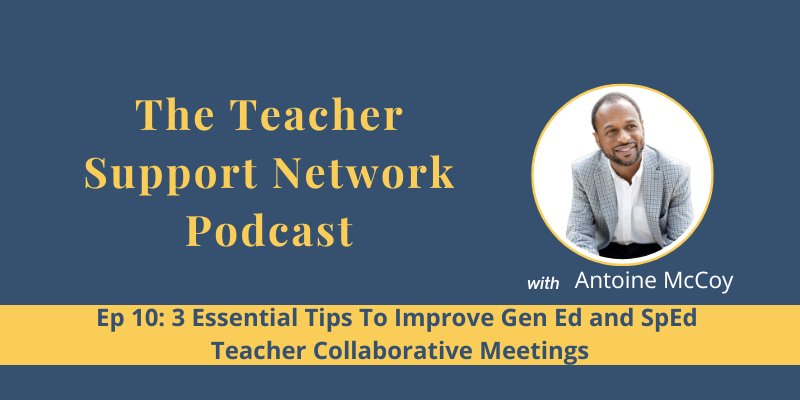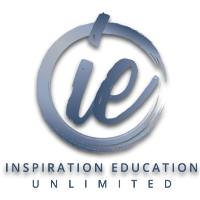
In this episode ~
In this episode, we discuss the importance of regular, focused, and productive meetings between General Education (Gen Ed) and Special Education (SpEd) teachers.
Three important actionable tips will be discussed to help ensure collaborative meetings between General and Special education teachers lead to tangible progress in supporting students with disabilities in the mainstream classroom.
Listen in~
00:00 The Importance of Consistent Meetings
02:04 setting a schedule
02:26 Following a Focused Agenda
03:54 Setting Actionable Next Steps
04:51 Pro Tip for Effective Meetings
05:46 Recap and Final Thoughts
06:35 Conclusion and Call to Action
Resources Mentioned in This Episode:
Download Gen Ed & SpEd Teachers Collaborative Conversations Guide here.
Join my Newsletter for a weekly dose of practical strategies, tips, resources and inspiration to support you on your teaching journey here.
Transcript
Hi and welcome to the Teacher Support Network podcast. I'm Antoine McCoy, and today we're diving into a crucial topic for educators, How Gen Ed and SpEd teachers can more effectively collaborate together by having regular intentional meetings to better support students with disabilities in their classes.
So as we know, students with disabilities often thrive in classrooms where Gen Ed and SpEd teachers work together seamlessly. But how can we ensure that collaboration actually happens consistently?
In today's episode, I'm going to share three actionable tips that will help both Gen Ed and SpEd teachers have more meaningful and productive informal meetings that benefit their students with disabilities.
So let's just dive right into it. The first tip is to schedule consistent meeting check ins. This first tip was about setting up a regular scheduled meeting together. It's so easy for gen ed teachers or Sped teachers to get caught up in their individual jobs or responsibilities and tasks, which are all very important.
But it's so crucial to carve out consistent time to meet together. Now, I know you may be saying, because we've talked about this before in other episodes, I don't have time to meet regularly. And that might be the case for many of you. Try as best as you can to make it happen. Whether it's a weekly or bi weekly meeting, make sure to just block off some time in your calendar that's dedicated solely to supporting the needs of students with disabilities in your classroom or on your caseload.
Even a 15, 20, or 30 minute meeting held consistently can make a big difference when you're regularly revisiting student progress, um, discussing strategies that might work, aligning instruction, or addressing pertinent needs in the moment. This works because consistent meetings create predictability for both Gen Ed and SpEd teachers and it ensures that nothing gets overlooked and gives both teachers a chance to have input and adjust and adapt as needed for specific situations.
So want a practical way to schedule consistent meetings?
I suggest you use shared digital calendars like Google Calendar or Microsoft Outlook, which many schools and organizations use, or other scheduling tools to streamline the process to make sure meetings don't slip through the cracks.
So now let's look at tip number two: Follow a focused agenda. This second tip is to always follow a predetermined agenda focused on a specific topic or specific students during your meetings. Each time you meet, ensure that you're aligning your conversations around the specific needs of the students with disabilities you’re supporting based upon the needs found in the IEP.
So will you be talking about a specific student's accommodations in the classroom? Their academic progress? Behavior supports? Co-teaching strategies, if you're working together in co-taught classes? Lesson planning? Differentiating supports? Assessment supports or modifications and so forth. There's so many topics to discuss.
The goal is to focus your time on specific topics, themes, or individual students, and not talk about so many things that you don't leave the meeting without actually getting things done.
So want a practical way to have a focus meeting? I suggest before each meeting both teachers agree upon what topic or specific students you will be discussing and then use a timer in the meeting to stay focused and on task. If you're going to be talking about specific students, use that time to work on talking about the specific needs of that student within that time frame you have already set out for your collaborative meeting together.
This brings me to the third and last tip. Set actionable next steps. So this final tip, the final tip is to always end your meetings with clear, actionable, and realistic next steps for both the Gen Ed teacher and the SpEd teacher.
It's not enough to just talk about ideas or strategies that you had in those meetings. You want to leave each meeting with specific tasks for each of you to follow through on. So whether it's adjusting a lesson plan, trying a new behavioral strategy, gathering progress monitoring data, or checking in with a student's progress in a particular area, have concrete action items that you come up with for each of you.
That ensures that your collaborative meetings lead to real change in the classroom for your students with disabilities. It also helps both teachers feel like they're making tangible progress in supporting their students with IEPs in their classroom.
So here's a pro tip you can add to your collaborative meeting toolkit. Have one of the teachers, maybe the Gen Ed teacher or the SpEd teacher, take notes on what was discussed in the meeting and the next steps for each person. Then keep them stored in a communications or meeting notebook or a shared Google drive.
This keeps a record of accountability and a reference point that you both can review again in the future and use throughout the entire school year. It also helps you keep a record of what topics or students you've been discussing and what topics or students you may need to give more attention to in the future because you've been talking a great deal in your meetings about a specific student or a specific topic and you're neglecting other ones. So having that record stored will let you go back and be able to see where you may need to give more attention to in upcoming meetings.
So, to wrap up, remember the three key tips for making your intentional meetings as productive as possible. One, schedule consistent meeting check-ins, two, follow a focused agenda, and three, set actionable next steps for both the Gen Ed and SpEd teacher.
If you're not already having regular meetings with your teaching partner, I challenge you to set up your first meeting this week. And if you are having regular meetings, then I encourage you to keep it up and the challenge may be to maybe add some of the tips I discussed in this week's episode to what you're already doing if you're not doing it already.
Even a quick 15 minute conversation can make a huge impact on the success of students with disabilities in your classroom. So, that's it for now. Thanks for listening.
If you found this episode helpful, be sure to subscribe, leave a review and share with a fellow educator. I'd love to hear how you collaborate with your Gen Ed or SpEd colleagues.
So feel free to share your tips in the comments section on the show notes page for this episode and also while you're there, make sure you grab our free Gen Ed and SpEd Teacher Collaborative Conversations Guide under the resource section. You can use the questions in that guide as a springboard to have a more focused intentional meeting with your Gen Ed and Sped Teacher partner in the near future.
So that's it for now. Until next time, keep collaborating together and making a difference in the lives of your students. Bye for now.
Rate, Review, & Subscribe on Apple Podcasts
Enjoy this episode?
Please consider rating and reviewing the podcast! Your support helps me support more teachers - just like you - create inclusive classrooms, foster effective teacher collaboration, and find balance with the demands of teaching in and outside of the classroom
It's easy! Click here, scroll to the bottom, tap to rate with five stars, and select "Write a Review." I'd love to know what was the most helpful or encouraging about the episode!
While you're there, you can subscribe to the podcast if you haven't already. If you're not subscribed, you may very well miss out on future episodes. 🙂 Subscribe now!


